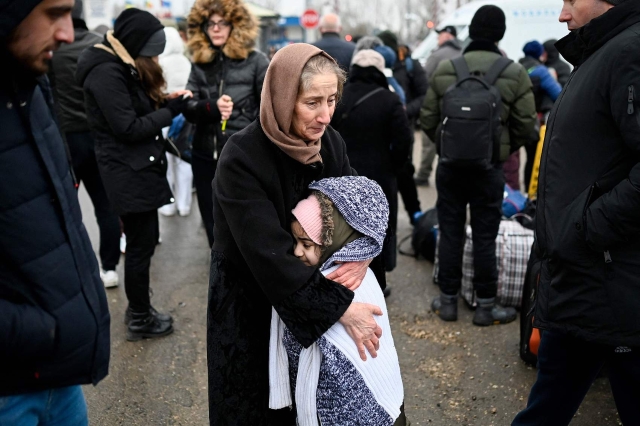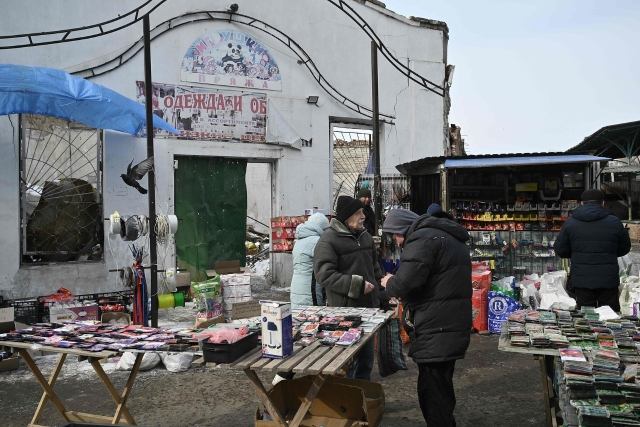
A woman hugs a girl as refugees from Ukraine wait for transport at the Moldova-Ukrainian border on March 1, 2022 (Photo: CFP)
Since the breakout on February 24, 2022, no one would have imagined that a "special military operation" against Ukraine could drag on for three years. In terms of morality and reality, this formidable saga must be terminated through dialogue with all the stakeholders involved.
From the full-scale breakout to a stalemate on the front lines, and currently a long-term state of attrition warfare, the surging death toll over these three years has relentlessly appeared on newspaper websites.
President of Ukraine Volodymyr Zelenskyy confessed in a recent interview that as of February this year, over 46,000 Ukrainian soldiers have been killed and 380,000 injured since the start of the all-out conflict.
Correspondingly, Russia has not unveiled specific numbers of casualties since September 2022. However, according to data analyzed by the BBC, over 95,000 people fighting for the Russian military have died on the Ukrainian battlefield.
The three years of fighting have indisputably incurred a humanitarian crisis. The Office of the United Nations High Commissioner for Human Rights verified nearly 42,000 civilian casualties during the Russia-Ukraine conflict as of the end of January this year. The UN Refugee Agency estimates that 10.6 million people are displaced, equivalent to a quarter of Ukraine's population before February 24, 2022.

Local residents shop at a local market in the city of Sloviansk, Donetsk region on February 23, 2025. (Photo: CFP)
In the economic domain, both sides have weathered a heavy blow since the start of the conflict, blurring the outlook of the global economy.
Based on the latest joint Rapid Damage and Needs Assessment (RDNA4) commissioned by the Ukrainian Government, the World Bank Group, the European Commission, and the United Nations, released on February 25, the direct damage in Ukraine has reached $176 billion from February 24, 2022, to the end of 2024.
Sectors such as housing, transport, energy, commerce and industry, as well as education, have been the hardest hit. The assessment report projected that the total cost of Ukraine's reconstruction and recovery would be $524 billion over the next decade.
Since the conflict began, Russia has been subject to over 20,000 sanctions aggregated so far. Earlier on February 24, the EU Foreign Ministers' Meeting passed the 16th round of sanctions against Russia, covering fields such as energy, trade, transportation, infrastructure, and finance. As young men serve in the military, the Russian economy faces a labor shortage.
Inflation in Russia still remains high, at 9.5% in 2024, mainly owing to its high military and security spending. Polls show that inflation is the primary factor in Russia's economic plight. Prices of staple foods such as butter, eggs, and vegetables have soared since the conflict started.
The three-year conflict has disrupted the traditional international industrial chain and intensified the commodification of trade. The ensuing de-globalization has given rise to uncertainty regarding world economic prospects.
Additionally, Russia's military expenditure accounted for 8.7% of GDP in 2024, triggering European countries to be on the cusp of an arms race. European members' military spending rises to 2% of their GDP on average. The United Kingdom has voiced that its military spending will rise to 2.5% of GDP in 2027. Earlier this month, Poland stated that it planned to spend 4.7% of GDP on defense this year.

An old woman is evacuated by a charity foundation from the Donetsk region, Ukraine, on 25 February 2025. (Photo: CFP)
Amid the third year of the conflict, voices and calls for peace dialogue have sprung up in newspapers, among political leaders, as well as among the masses.
Earlier in September last year, China and Brazil made efforts to gather developing countries to end the Russia-Ukraine conflict. US President Donald Trump, since his inauguration, has called for a resolution to the issue. Nonetheless, talks between the US Secretary of State and the Russian Foreign Minister a week earlier in Saudi Arabia have alienated European countries.
Three versions of UN resolution drafts addressing the conundrum within the past three days have laid bare the multi-stakeholder's concerns and interests, heralding an onerous path for peace.
However, to cite former UK Prime Minister Winston Churchill's quote, “To jaw-jaw is always better than to war-war,” it's time for peace negotiations between Russia and Ukraine, with the relevant stakeholders involved.
Author: Zhang Ruijun
Editor: Yuan Zixiang, James, Shen He
















